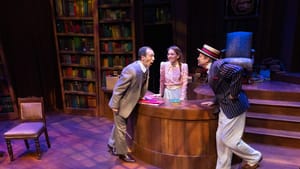Stay in the Loop
BSR publishes on a weekly schedule, with an email newsletter every Wednesday and Thursday morning. There’s no paywall, and subscribing is always free.
Intellect in overdrive
Lantern Theater Company presents Tom Stoppard's Travesties

Some playwrights wear their hearts on their sleeves. Tom Stoppard wears his library card. Travesties finds him at his most intellectual, overstuffed, and insufferable. Lantern Theater Company’s season-opening production further compounds the problems of the script with slack pacing and dire miscasting.
A travesty of war
After scrutinizing Shakespearean characters in Rosencrantz and Guildenstern Are Dead, Stoppard turned his attention to real-life literati in this 1974 farce. The action depicts Irish modernist James Joyce (Anthony Lawton) and Romanian dadaist Tristan Tzara (Dave Johnson) waiting out World War I in neutral Zurich, honing their artistic voices and outsize personalities. Also stalking the periphery is Vladimir Lenin (Gregory Isaac), hastening the Russian Revolution with his grim, black-clad wife Nadya (Lee Minora).
Not content to limit himself to historical figures, Stoppard also interpolates the heroines of Oscar Wilde’s The Importance of Being Earnest, with Gwendolyn (Morgan Charéce Hall) and Cecily (Campbell O’Hare) envisioned here as a pair of literary hangers-on.
All this café society intrigue is distilled through the memory of Henry Carr (Leonard C. Haas), a minor civil servant from England with a war injury and a consulate posting. Under the guise of writing his memoirs, Carr relives what was perhaps the one truly exciting and glamorous moment of his life, rubbing shoulders and trading insults with these boldface names.
Stoppard peppers his scenes with the quirky characteristics of his dramatic personae: Tzara’s anti-language poetry, Joyce’s penchant for limericks, Lenin’s speechifying. He also plays with time and memory, by stopping and restarting scenes with minor variation, and through anachronistic allusions to the Jazz Age and the Swinging Sixties. The results are occasionally clever, but more often tiring.
You could imagine the bilious action harnessed into a coherent, satisfying whole, but under Charles McMahon’s direction, this staging lacks the precision and the discipline for such an optimal outcome. On opening night, the company, who seemed underrehearsed, betrayed little confidence in their delivery of the playwright’s heady banter. As a result, the cerebral punchlines frequently didn’t register until well after they’d been dropped.
The interminable first act, running 100 minutes, unfolded at a glacial pace. The variations baked into the structure of the play felt like mere repetition, and the goal of Stoppard’s device never became entirely clear. While the fits and starts were delineated rigidly, the alterations were not executed with the right sense of comedic overstatement. The results were sloppy and tried my patience.
Off the mark
Haas also bears a fair amount of blame. Carr needs to be a magnetic, mercurial, undeniable narrator who holds the audience in the palm of his hand as he guides us through his mind’s eye. But this actor’s stiff presence and unsteady line readings regularly sink any forward momentum the production might pick up.
Some supporting performers fare better, with Lawton finding special success in Joyce’s preening and pretentious countenance. Johnson brings his usual rubber-faced comic timing to Tzara, and even if you’ve seen his schtick before, it remains enjoyable. Hall infuses Gwnedolyn with charm and a steely undercurrent that makes up for an occasionally wandering accent. (Across the board, the dialects need work.) David Bardeen steals a few scenes as Carr’s tippling manservant Bennett, a not-so-subtle socialist sympathizer.
O’Hare executes with admirable abandon a burlesque dance that’s meant to seduce Carr to the side of the revolutionaries. Leave it to Stoppard to craft a Marxist striptease with a somewhat straight face.
Nick Embree’s book-lined library set makes good use of the oddly angled playing space at St. Stephen’s Theater, and costume designer Marla Jurglanis realizes Carr’s sartorial passions with élan. Yet, too often, in this otherwise bland outing, you’re left to reflect on how rarely Stoppard’s imagined cleverness coalesces into enjoyable humor. Travesties can feel like the work of a precocious teenager intent on showing his parents how smart he thinks he is. That Lantern’s production cannot overcome that this is, well, a travesty.
What, When, Where
Travesties. By Tom Stoppard, directed by Charles McMahon. Lantern Theater Company. Through October 9, 2022, at St. Stephen’s Theater, 923 Ludlow Street, Philadelphia. $25-$42. (215) 829-0395 or lanterntheater.org.
Masks are required inside the theater.
Accessibility
St. Stephen’s Theater is not wheelchair accessible.
Sign up for our newsletter
All of the week's new articles, all in one place. Sign up for the free weekly BSR newsletters, and don't miss a conversation.

 Cameron Kelsall
Cameron Kelsall